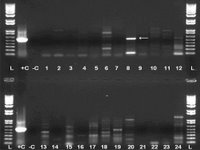New advanced DNA test could make pap smears obsolete
Lufkin, TX
Annual pap smears could soon move to medical history books. Dr. Kay Carter said the new advanced dna test could save women's lives. "It can tell whether the DNA is high risk or low risk DNA for the HPV virus," said Dr. Carter.
She said the DNA test will make gynecologists' jobs easier. That is because it is a one step screening process
"If a woman has a high risk HPV virus then we will automatically go directly to biopsies and test that gives us more accurate information than the pap smear screen does," said Dr. Carter.
Dr. Carter believes most women get an annual pap smear out of routine and don't really understand its purpose. "I don't think that women classically understand the pap smear and why we have to do it," said Dr. Carter. She said the new DNA test makes it easier to understand that there is a virus that causes cervical cancer and women need to be checked for that virus.
Women over 30 could drop the annual pap smear and instead get a DNA test every three, five or ten years. The women we talked to said the pap smear does not bother them. "It's better to be safe than sorry, waiting three years is a long time, once a year is pretty accurate," said Becca Tatum, patient.
"You're going to have to come in for a yearly exam anyways, a breast exam, a pelvic exam so you mine as well get the pap smear done while you are," said Wendy Burger, patient.
Dr. Carter said over time, the DNA test will also cut yearly medical expenses.
Labels: Cervical Cancer Awareness, Cervical Cancer Screening, DNA Test, DNA. Cervical Cancer, Pap Smear, Pap Smear Test

